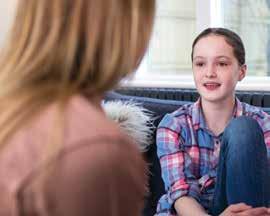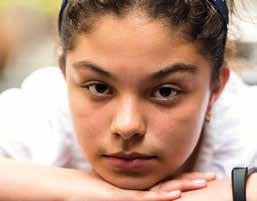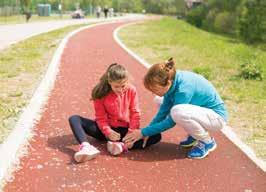
15 minute read
SEATTLE CHILDREN’S
A Seattle Children’s Publication | Spring 2021
Start Talking Early About Drugs and Alcohol
As parents who love our kids and want to protect them, it’s our duty to equip them to stay away from drugs and alcohol. Honest, open conversations help our kids develop the attitudes, skills and confidence needed to make smart choices — even when their peers are not.
When should we start these conversations? For most kids, around fourth or fifth grade is appropriate — or even earlier, if the situation feels right. Then, as kids move into middle school, these talks can become more detailed, and more frequent.
Talking about marijuana is a good place to start. Because it’s legal for adults in Washington, marijuana is easy to get. And unfortunately, some forms of marijuana — vaping and edibles in particular — are quick and simple to ingest. They’re also easy to conceal, both at home and at school. Start your discussion by learning what your child knows. Do they know marijuana is illegal for anyone

Take 5
It’s normal to feel overwhelmed and frustrated. Recognize when you have reached your limit. Then Take 5: 1. Stop. Step away. Give yourself space. 2. Take a short break to breathe. Allow your heart rate to return to normal. 3. Remind yourself, “I can do this” or “It’s important to stay calm.” 4. Ask yourself, “How can I handle this situation in a way that I will feel good about?” 5. If possible, ask for support from a partner or family member. Call or text a friend or neighbor. It’s OK to ask for help.
to learn more: Visit seattlechildrens.org/copingandcovid. under age 21? Do they understand that it’s addictive? While no one ever expects to become addicted, kids who start using marijuana before age 14 are four times more likely than others to become addicted by adulthood. The only sure way to prevent addiction is to never try it in the first place.
Keep in mind that you’re not lecturing. You’re sharing knowledge and ideas. Help your child practice saying no. Role-play social situations where they’re offered drugs or alcohol, and what they can say to strongly refuse. Be sure they know it’s OK to walk away from any situation — and call you for a ride, or help getting one, if needed.
It’s also important to be clear about your expectations. The message can be as simple as “We want you to do well in school, stay healthy, and have lots of opportunities now and in the future. Dependence and addiction have the power to ruin your entire life. That’s why we have a family rule against you even trying drugs and alcohol.”
Of course, it’s vital that parents themselves model healthy coping skills. And everyone on the parenting team must be consistent with rules and messages, even if they live in separate households.
By using our influence in a positive way — and keeping the conversations going — we can help our kids chart their course and pursue their dreams.
to learn more: Visit starttalkingnow.org/parents.
End Nighttime Wetting with a Consistent Plan

Protecting children from dangerous TV and furniture tip-overs is a crucial part of keeping them safe. Every day in the U.S., falling TVs send 10 kids to the emergency room; every three weeks a child dies from these injuries. Prevent a tragedy from happening by mounting fl at-panel TVs to the wall. (Older, box-style TVs should be placed on low, stable surfaces.) Anchor furniture like bookshelves, cabinets and dressers to the wall with anti-tip brackets, braces or wall straps. Don’t allow a child of any age to climb up on furniture. Avoid placing TV remotes, toys or other items where kids might be tempted to climb up or reach for them. Also, install stops on dresser drawers to prevent them from being pulled all the way out.
to learn more: Visit safekids.org/tv.
Many adults can still remember the embarrassment they felt as kids aft er wetting the bed. Nighttime wetting is common, and is generally considered a problem when it happens more than twice a month aft er age 6 or so. In some cases, a child has never been consistently dry at night; this usually happens when the body makes too much urine and the child doesn’t wake up when the bladder is full. In other cases, a child who was consistently dry at night starts wetting again; the cause here may be physical, emotional, or due to a change in their sleep patterns. Usually, children stop wetting at night as they grow older without any treatment. Never shame or blame your child, but do check with their doctor if you’re concerned. Your child’s doctor may help you develop a night-training program, which will likely include holding back liquids before bedtime, ensuring the bladder is empty before sleep, and waking the child during the night to go pee in the bathroom.

Spotting Signs of a Mental-Health Problem
Childhood and adolescence are full of big changes, and it’s normal for kids to experience some emotional ups and downs. Th is is even more true during COVID-19. But at least one in fi ve kids will have a diagnosable mentalhealth problem that requires treatment. It’s very important that parents stay tuned-in to their child, and keep communications open, so they can better detect early signs of emotional problems.
What are some indicators that a child is dealing with mental-health issues? Common signs include feeling very sad or withdrawn for two or more weeks; severe mood swings; changes in eating or sleeping habits; disinterest in personal hygiene; or sudden, overwhelming fear or anxiety for no apparent reason. If a child shows one or more of these signs, talk with them and with their doctor right away. Don’t ignore the signs.
Parents might worry that bringing up the subject of mental health with their child may somehow make the problem worse — or make an imagined problem somehow come true. Th is isn’t the case. Kids who are struggling typically feel relieved to have the topic out in the open. It’s important that parents are calm and compassionate, and that they reassure their child that there’s no reason to feel embarrassment or shame. Emphasize that this is a solvable problem, and that you will do everything you can to help them feel better. Keep in mind that even tweens and teens who won’t open up fully to a parent will usually do so with a doctor or another mental-health expert.
Early action and eff ective treatment can help your child get back on track, continue their healthy development, and feel hopeful about their future.


Life Jackets
Fishing and boating season is here, and swim season is on the way. Now’s the time to double-check that your family’s life jackets are U.S. Coast Guard-approved, that they are in good condition and that they fi t properly. For kids, the fi t depends on their current size and weight: never buy a life jacket to ‘grow into.’ When fastened, a life jacket should be snug yet comfortable. To test the fi t, lift your child by the shoulders of the jacket: their chin and ears should not slip down into the jacket. For younger children, choose a life jacket with a collar for head support, and a strap between the legs. And of course, remember that kids must always be supervised by an adult when in or near the water.
to learn more: Visit seattlechildrens.org/dp.
Quick Tip
Keep aiming for fi ve servings of fruits and vegetables a day. Eat what’s in season or buy frozen, dried and canned items to cut down on cost.
facebook.com/seattlechildrens
instagram.com/seattlechildrens
twitter.com/seattlechildren
Treating Ankle Sprains
Ankle sprains are one of the most common injuries for active kids. A sprain happens when ligaments in the ankle stretch or tear — usually due to twisting or turning. To treat an ankle sprain at home, follow the PRICE steps: Protection, Rest, Ice, Compression and Elevation. Protect the sprain with a brace, splint or boot. Rest from activities that cause pain or limping. Ice the ankle for the fi rst one to three days, three to fi ve times a day for 15 to 20 minutes each time. Compress the ankle with an elastic bandage. Elevate the ankle above the heart level by lying down with pillows under the foot. Call your child’s doctor for help deciding if they should be seen or if you can continue treating their injury at home.

Prevent Lead Poisoning
Exposure to lead can harm brain growth in young children, especially those 6 and younger. Normally, a child’s body absorbs essential nutrients that help it make healthy bones, muscles and brain connections. But when lead is available, the body can absorb it instead, causing permanent and oft en serious health problems. Th e most common source of this heavy metal is lead-based paint in older homes. If your toddler or preschooler regularly spends time in a house built before 1950 — or one built before 1978 that has had recent repairs or improvements — ask your doctor for a blood-lead screening test. Learn more about sources of lead, and how to prevent lead poisoning, at the link below.

Regional Clinic Locations
• Bellevue • Everett • Federal Way • Olympia • Tri-Cities • Wenatchee
Primary Care Clinic
• Odessa Brown Children’s Clinic
Main Hospital Numbers
206-987-2000 866-987-2000 (Toll-free)
Online Resources
Visit seattlechildrens.org for the following: • Child Health Advice • my Good Growing email newsletter • Doctor Finder • On The Pulse and Autism blogs • Medical condition information • Health & safety information • Ways to help Seattle Children’s • Research Institute information
Heather Cooper is the Editor of Good Growing, which is produced four times a year by the Marketing Communications Department of Seattle Children’s. You can fi nd Good Growing in the January, April, July and October issues of ParentMap and on our website seattlechildrens.org. For permission to reprint articles for noncommercial purposes or to receive Good Growing in an alternate format, call 206-987-5323. The inclusion of any resource or website does not imply endorsement. Your child’s needs are unique. Before you act or rely upon information, please talk with your child’s healthcare provider. © 2021 Seattle Children’s, Seattle, Washington.
As the COVID-19 situation changes, we continue to adjust or postpone our classes and events to follow publichealth recommendations. We now offer some classes online while some are on pause. Please check our website for the latest information. Scholarships are available. If you would like to ask about a scholarship, use the contact information for the class you’re interested in to connect with the registrar.
PARENTING CLASSES
Autism 101
This free 90-minute lecture is designed to provide information and support to parents and families of children recently diagnosed with an autism spectrum disorder. A portion of each session is dedicated to answering questions from the attendees. View dates, sign up for live streaming or view a past lecture at seattlechildrens.org/autism101. Email Autism101@seattlechildrens.org if you have questions.
Autism 200 Series
Autism 200 is a series of free 90-minute classes for parents and caregivers of children with autism who wish to better understand autism spectrum disorder. Each class features a different topic. Classes are usually offered on the third Thursday of the month, 7 to 8:30 p.m., via live streaming. View dates and topics, sign up for live streaming or view past Autism 200 lectures at seattlechildrens.org/autism200. Email Autism200@seattlechildrens.org if you have questions.
Babysafe
Babysafe is a four-hour class for new and expectant parents and others who care for babies. Topics include infant development, baby safety, injury prevention and care of common injuries for infants from birth through 12 months of age. Infant CPR is demonstrated and practiced, but this is not a certification class. This class is currently available virtually via Zoom. The cost is $85 and each registration is good for two people from the same family. View dates at seattlechildrens.org/classes or call 206-789-2306 if you have questions.
Youth Mental Health First Aid
This class is for adults who regularly interact with adolescents ages 12 to 18. Youth Mental Health First Aid will improve your knowledge of mental health and substance-use problems and will teach you how to connect youth with care when needed. A virtual version of Youth Mental Health First Aid is now available for free as a two-part series. The series includes a self-guided course and a live instructor-led course. The date you register for is the date of the live instructor-led course. View dates at seattlechildrens.org/classes or call 206-987-9878 if you have questions. CHILD, PRETEEN AND TEEN CLASSES
Better Babysitters
For youth, ages 11 to 14. Students learn about responsible babysitting, basic child development, infant and child care, safety, handling emergencies, age-appropriate toys, business tips and parent expectations. Now being offered virtually via Zoom. This is a two-part class, on two consecutive weekend dates. The cost is $50. View dates and register at seattlechildrens.org/classes or call 206-987-9878 if you have questions.
Body Talk — Building Body Wisdom for Moving & Eating
This new online two-part series is for preteens ages 9 to 12 and a grown-up. Each session is one hour long and is an opportunity to have conversations about the important ideas of eating and moving to build body wisdom. In Building Body Wisdom for Moving, preteens will learn about tuning into internal motivation and what to pay attention to as a mover. In Building Body Wisdom for Eating, preteens will learn how to tune into their senses, how to understand hunger and fullness cues, and about nutrition information. The cost for this series is $45. Sessions are facilitated by experts from Opal Food + Body Wisdom. View dates at seattlechildrens.org/ classes or call 206-789-2306 if you have questions.
CPR and First Aid for Babysitters
For youth, ages 11 to 15. Topics include pediatric CPR, treatment for choking, and first-aid skills. Students receive an American Heart Association Heartsaver Pediatric First Aid, CPR, AED completion card, which is valid for two years. This class is being offered as a two-part series. The series includes a virtual session as well as a short in-person skills check. The cost is $75. For the most current class information, visit seattlechildrens.org/classes or call 206-987-2304 if you have questions.
The Chat
The Chat is a new online workshop series on puberty and sex that reflects the content from the in-person classes, For Boys and For Girls. Offered via Zoom, each 45-minute workshop is for preteens 10 to 12 years old, plus a parent or trusted adult. You may take any individual workshop or all five. If you register for all five events, we recommend starting with BO, Pimples and Hair — Oh My! and ending with Being Connected: Sex, Love and Everything In Between. While families can choose to attend any combination of workshops, the information in earlier sessions provides a foundation for understanding later sessions. The cost is $25 per workshop or the series of five for $100. View dates at seattlechildrens. org/classes or call 206-789-2306 if you have questions. See a trailer for The Chat at greatconversations.com.

EVENTS
Free Virtual Car-Seat Checks
King County Certified Child Passenger Safety Technicians are offering free virtual car-seat check appointments via video-chat platforms. For more information, email Laura Miccile at laura. miccile@kingcounty.gov or call 206-477-8664. South County Fire and Safe Kids Snohomish County are offering free virtual car-seat classes. Registration is required. Visit southsnofire.org/ education/child-passenger-safety.
ADVANCE IN MATH this Summer

WITH COURSES ONLINE OR IN-PERSON

The Russian School of Mathematics is an award-winning, afterschool math enrichment program. Students can choose from a variety of K-12 courses that will be taught in a live, interactive, virtual classroom setting during our 6 week summer session. In-person courses may also be available; please inquire with our office for more information.

Summer Classes Begin June 28th
Bellevue (425) 518-6114
Factoria (425) 230-6452
RussianSchool.com
Redmond (425) 616-3511

MUST PURCHASE TICKETS IN ADVANCE AT THEFAIR.COM
Enjoy a fun, safe experience with your family with drive-thru and step-out activities! Included with Your Carload Admission: Farm Animals • Strolling Entertainment • Shopping • Brad’s World of Reptiles • Daffodil Festival Displays and more! Plus, add on rides & games, monster truck rides, drive-in movies and more! Buy tickets early to get your preferred selection at THEFAIR.COM
— American Camp Association
“Transformative!”
— Teen Magazine
— Dr. Bob Selverstone, Emmy®-nominated special, Children’s Television Workshop/PBS

From the writer/ presenter of the Emmy® award-winning Parenting Puzzle series on PBS-TV
An easy-to-use book by an internationally acclaimed educator that is packed with warm, practical tools—exactly what to say and do to build great skills for life, including kindness, respect, confi dence, responsibility, persistence, and creativity in all ages.
The Holocaust Writing, Art, & Film Contest
inspires and challenges students to explore the history and stories of the Holocaust and to consider how individual actions, big and small, make a difference.

Open to students grades 5-12 with more than 30 prizes awarded. Deadline: April 30.
Details at HolocaustCenterSeattle.org/WAC
Art by Cherilynne Gacasan





